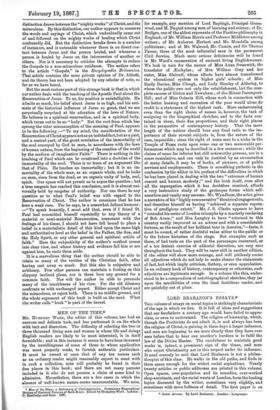MEN OF Tut TIME" Mn. HUMPHRY WARD, the editor of
this volume, has had an onerous and delicate task, and has performed it on the whole with tact and discretion. The difficulty of selecting the two or three thousand living men and. women in whose life and doings English readers are likely to be most interested, "is in itself formidable; and in this instance it seems to have been increased by the unwillingness of some of those to whom application was most properly made, to furnish authentic particulars. It must be owned at once that of any ten names such as an ordinary reader might reasonably expect to meet with in such a collection, nine will probably be found in their due places in this hook; and there are not many persons included in it who do not possess a claim of some kind to admission. Nevertheless, there are a few cases in which the absence of well-known names seems unaccountable. We miss, • Men of the Time: a Dictionary of Bontomporariea Containing Biographical Notices of Eminent Benson of Both Sexes. Edited by Bumphry Ward. London G. Routledge and Son, 1887. for example, any mention of Lord Rayleigh, Principal Green. wood, and N. Naquet among men of learning and science; of Dr. Bridges, one of the ablest exponents of the Positive philosophy in England; of Mr. William Morris and Professor Middleton among writers ; of Mr. Anberon Herbert and Mr. Mundella among politicians ; and of Mr. Walrond, Mr. Cumin, and Sir Thomas Farrer, three of the most influential men in the permanent Civil Service. Much more serious deficiencies will be found in Mr. Ward's enumeration of eminent living Englishwomen. We look in vain for the names of Miss Anna Swanwick, the translator of lEschylas ; of Mrs. William Grey and her sister, Miss Shirreff, whose efforts have almost transformed the educational system in higher girls' schools ; of Miss Emily Davies, Miss Clough, and Lady Stanley of Alderley, to whom the public owe not only the establishment, but the com- plete success of Girton and Newnham ; of the Misses Davenport- Hill; and of Miss Octavia Hill, whose work in connection with the better housing and recreation of the poor would alone do credit to a statesman of the highest rank. More embarrassing even than the right choice of names is, however, the task of assigning to the biographical sketches, and to the facts con- tained in them, their due proportions, and their right places in the perspective of contemporary history. That the mere length of the notices should bear any fixed ratio to the im- portance of their several subjects is, from the nature of the case, impossible ; since the right of some men to a niche in the Temple of Fame rests upon some one or two memorable per- formances which may be described in a few sentences ; while the claims of some far inferior but still noteworthy persons, are in a sense cumulative, and can only be justified by an enumeration of many details, it may be of books, of pictures, or of public services and employments. There is something pathetic in the confession by the editor in his preface of the difficulties in which he has been placed in dealing with the two "extremes of human conceit and human modesty;" and the book itself, even after all the expurgation which it has doubtless received, affords a very instructive study of the grotesque forms which self- assertion and vanity may assume. Mr. Wyndham, the actor, gives a narrative of his "highly remunerative" theatrical engagements, and describes himself as having "achieved a separate reputa- tion of prodigious extent." Mr. J. S. Clarke appears to have "extended his series of London triumphs by a masterly rendering of Bob Acres ;" and Mrs. Langtry to have "returned to this country vastly improved as an actress and with a considerable fortune, as the result of her brilliant tour in America,"—facts, it must be owned, of rather doubtful value either to the public or to the future historian of the stage. But examples such as these, of had taste on the part of the personages concerned, or of a too lenient exercise of editorial discretion, are very rare throughout the book. They will be rarer still in another edition, if the editor will show more courage, and will pitilessly excise all adjectives which do not help to make clearer the statements of fact, but which imply criticism, flattery, or even approbation. In an ordinary book of history, contemporary or otherwise, such adjectives are legitimate enough. In a volume like this, under- stood to be a compendium of autobiographical sketches, they jar upon the sensibilities of even the least fastidious reader, and are painfully out of place.


































 Previous page
Previous page